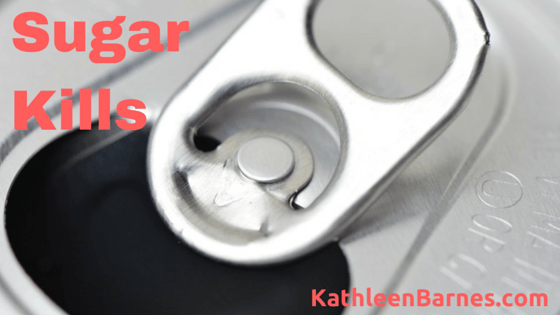 Sugar addiction has been compared to heroin addiction in terms of its severity. In fact, I think the similarity is more akin to alcohol addiction. You’ll often see people in recovery programs who end up gaining a great deal of weight because they substitute sugar for alcohol since the effects on brain chemistry are similar.
Sugar addiction has been compared to heroin addiction in terms of its severity. In fact, I think the similarity is more akin to alcohol addiction. You’ll often see people in recovery programs who end up gaining a great deal of weight because they substitute sugar for alcohol since the effects on brain chemistry are similar.
I also think many, if not most, Americans are sugar addicts.
What’s wrong with sugar? Most of us already know that excess sugar causes weight gain. And for most of us, if we eat a little we want a lot.
The average American now consumes 152 pounds of sugar a year, compared to 109 pounds in 1950, according to the U.S. Department of Agriculture. The average American drank 46 gallons of soft drinks a year, compared to 11 gallons 50 years earlier.
Avoid HFCS
The dangers of high sugar consumption have been well documented for more than a decade with increasing evidence that the ever-present high fructose corn syrup (HFCS) is particularly dangerous.
HFCS and other cheap corn-based sweeteners account for nearly 56 percent of all those high-calorie sweeteners, especially in sodas and juice drinks.
“At the heart of it all is the fact that excessive fructose consumption leads to insulin resistance and insulin resistance appears to be the root of many, if not most, chronic diseases,” says natural health expert Dr. Joseph Mercola.
All calories are not created equal, as I mentioned a few weeks ago when I wrote about The Calorie Lie.
Sugar converts almost directly to fat
Almost all of us are aware that high-calorie sugar is directly proportional with weight. However, calories from sugar compared to those from other food types act differently.
“Fat doesn’t make you fat. Sugar makes you fat,” says John Salerno, M.D., author of The Salerno Solution: An Ounce of Prevention, a Lifetime of Health.
Excess sugar is stored in the liver and muscles as glycogen, where it is then converted to fat, explains Dr. Salerno.
The obvious weight gain issue is just the tip of the sugar iceberg.
Extensive scientific research has also linked excess sugar consumption to Type 2 diabetes (no surprise here), liver disease, heart disease and hypertension and Alzheimer’s disease.
Dangers of artificial sweeteners
Artificial sweeteners are stealth health saboteurs. Ironically, artificial sweeteners like aspartame and saccharin not only give you the illusion that you are not consuming calories, they also contribute to cravings for more.
Sucralose (better known as Splenda, but also in other brands) can trigger the release of insulin, causing the body to react as though sugar has been taken in, over time contributing to insulin resistance and Type 2 diabetes.
Several studies also show that people who use artificial sweeteners (primarily in diet soft drinks) actually gain more weight than those who drink sugar-laden non-diet soft drinks.
Healthy alternatives
There are healthy alternatives:
- Stevia – a powdered extract of a South American plant, is the most popular natural sweetener, with no calories and no blood sugar swings. It’s extremely sweet—200-300 times sweeter than sugar — so a little goes a long way.
- Honey, while far from calorie-free, is high in heart-healthy flavonoids, anti-allergens and may even help lower cholesterol.
- Maple syrup, also not calorie-free, is a rich source of polyphenols, antioxidants that calm inflammation.
- All fruit has fructose, but it is a natural part of the fruit, not synthesized from corn products, as is HFCS. Fruit has numerous health benefits, so eat it in moderation and focus mainly on fruits and berries low on the glycemic index.








First, singling out high fructose corn syrup (HFCS) as the culprit driving an array of conditions is neither accurate nor productive. Despite its name, HFCS it is not high in fructose. In fact, just like table sugar (or sucrose), HFCS is a combination of two simple sugars – glucose and fructose. These two ingredients are virtually identical in structure; so much so, in fact, the body processes them both the same. Moreover, attempts to pin the blame on this ingredient as a unique contributor to obesity have been directly debunked by the American Medical Association, which concluded this ingredient is not a unique risk factor.
Second, science has repeatedly reaffirmed that low-calorie sweeteners are safe, and can help cut calories and promote weight loss. A study published in the American Journal of Clinical Nutrition verifies this fact, as well as debunks the myth that diet beverages cause an increased preference for sweet foods and beverages: http://bit.ly/Ik4zjC.
Quite simply, sugars are sugars and should be consumed in moderation, like all foods and beverages. We would also add that demonizing any one ingredient won’t help health; adopting a more holistic approach to overall diet and exercise will.